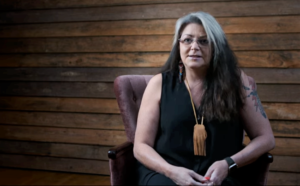Indigenous author explores the oppressive effects of The Hum on Indigenous people

By Rick Garrick
THUNDER BAY — Indigenous author Sandi Boucher recently highlighted The Hum’s oppressive effect on Indigenous people during a Jan. 4 YouTube video posting.
“I do a lot of work in the area of reconciliation on one side with non-Indigenous people but when I’m in our communities, I’m often talking about the effects of oppression,” says Boucher, Indigenous inspirational speaker, reconciliation consultant, and Seine River citizen in Treaty #3. “What I often focus on is internalized oppression, what happens to a member of a group that has been oppressed for so long that you start to internalize the stereotypes, you start to believe them yourself.”
Boucher says her YouTube video about The Hum focuses on why she made the comment, “They said it would never happen,” during her acceptance speech for the 2016 Business Person of the Year award in Thunder Bay.
“When people started asking me what I meant by that I had to ask myself, ‘What did I mean by that?’ because I couldn’t think of one person that had said that to me in those words,” Boucher says. “What I realized was growing up Anishinaabekwe, there was this constant hum in the background. In my mind, this little voice was constantly telling me. ‘They are never going to accept you, they are not going to hire you, they are not going to want to be your friend. Why do you think they are going to want you in that group? Why do you think they are going to hire you for that job?’ And on and on and on.”
Boucher says The Hum was something she had to battle every single time she tried to do something, such as making a new friend or applying for a new job.
“When I started sharing it with my audiences, I realized it was across the board,” Boucher says. “Every single time I was talking to an Indigenous audience, they heard The Hum, too, and they would share with me what the voice had said to them or the dreams they had given up on because of The Hum. So that is why I made that video and why I’m working to design a couple of courses to help Indigenous youth get past The Hum so they can enroll in post-secondary education.”
Boucher says she did not pursue a university education after completing high school with straight As.
“I went to college because I thought I could go to college but I believed only rich [non-Indigenous] people went to university,” Boucher says. “Now, do I know that’s not true? Absolutely. Logically, I know that but there was no way I thought I could fit in, and my teachers and people around me were shocked that I didn’t go, but that’s what The Hum does.”
Boucher says she also heard the voice when she released her first book, Honorary Indian, which shares her mother’s teachings.
“The voice was so loud telling me, ‘Why do you think anyone is going to buy your book?’ and now it’s a bestseller, it’s sold over 10,000 copies,” Boucher says. “But still, every single time I release something new, that voice is there, and I’m just really good at telling it to shut up now.”
Boucher says her A Day that can change Everything Webinar includes information on overcoming self doubts and barriers and her The Path course on reconciliation identifies The Hum and ways to get past it.
Information about Boucher’s videos, seminars, keynotes and books is posted online.

